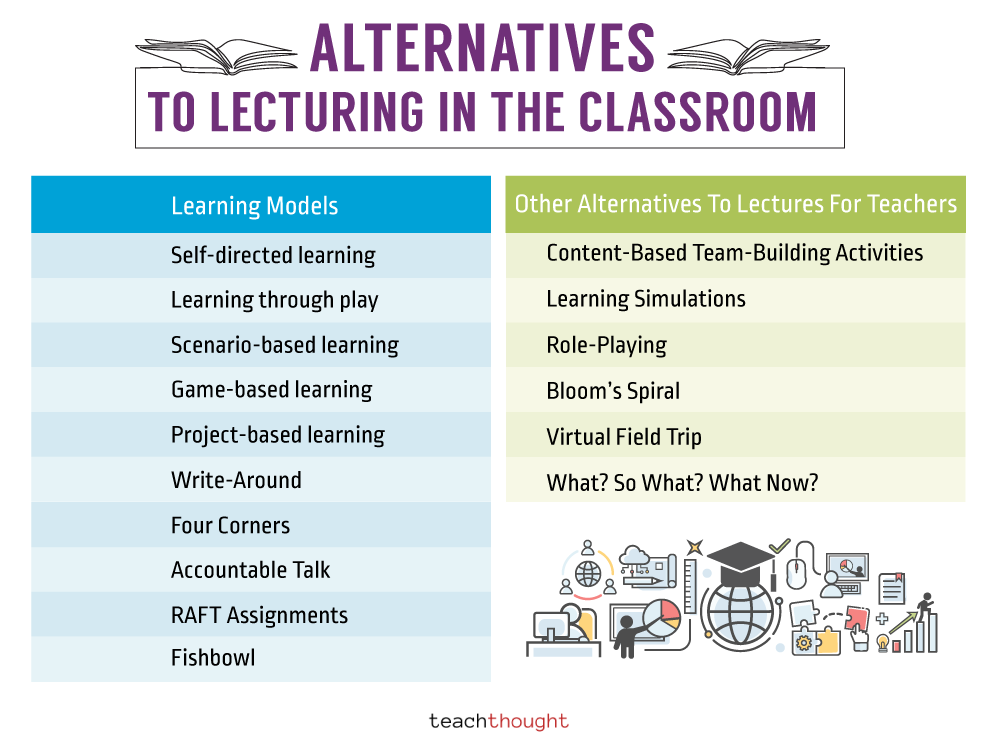What Are The Best Alternatives To Lecture In Teaching?
by TeachThought Staff
As teachers, when we lecture, we have the best of intentions.
We have a concept we want the class to understand, so we stand and explain it to them. We give them background. Offer details. Anticipate and pre-empt common misconceptions. Illuminate the more entertaining bits. Emphasize the nuance.
So explaining things isn’t ‘bad.’ But first, some clarification. Talking is not lecturing–it’s talking. Talking with students and expecting them to respond meaningfully isn’t lecture–that’s accountable talk, which might be closer to Socratic Discussion or dialogue or Paideia seminar. Explaining an idea verbally, especially if being done to clarify a context or history of circumstance–can be a powerful tool if used expertly.
Everyone loves a story, and unless you’re awful, your students probably like you and want to hear from you. But you can’t ‘give knowledge’ or ‘verbally annotate’ discovery and inquiry. Clearly this thinking comes from a place of constructivism, so it’s slanted that way. Lecture likely has a place in education. In the background knowledge-building phase of learning, for example.
Or in a ‘flipped classroom’ setting where the ‘lecture’ is designed to be consumed at the student’s own pace (using viewing strategies, for example).
Or when students have mastered a core set of understandings, and are ready–in unison–to hear something from an honest-to-goodness expert who only has an hour to unload what he/she knows. In these cases, when…
All students are similarly motivated
All students have mastered certain ‘listening strategies’
All students have strong note-taking skills and can adapt those strategies for a variety of content, delivery speed, and so on
All students have a similar background knowledge
…then lecture can be moderately effective (but even then it depends on what we mean by ‘effective.’) (Prince 2004)
The List of Alternatives To Lectures For Teachers
So then, the list. This is an interesting post to write because a large part of our content is to provide alternatives to lectures. In that way, our site at large could be seen as a compilation of alternatives to lecturing. But for those educators that’d like to see a kind of index all gathered in one place, with certain links to more in-depth analyses elsewhere, this post might help scratch that itch. This is a long list. The idea is to see a lot of awesome possibilities in one place, not write a book.
A few notes:
1. This is a mix of learning models and literacy strategies that can be used to accomplish what we hope a lecture might–‘give information’ and ‘promote understanding.’ Some of these aren’t perfect replacements for what a ‘good lecture’ is, but most, in spirit and function, are close.
2. Some of the ideas don’t have links–we’ll try to go back and add them. Suggest some in the comments if you know of a good one. We may go back and add brief definitions links to great content that then clarifies and extends these items with thinking, frameworks, strategies, and tools because some are admittedly confusing in name-only. We were going to include several videos and frameworks, but that makes the post clumsy and slow-loading on smaller mobile devices. If you get curious and/or confused and we still haven’t clarified something you’d like to know, let us know.
3. If you look at this list as a whole, it’s clear education is either changing or has a slew of tools it’s ignoring in not changing.
50 Alternatives To Lecturing
Learning Models
3. Scenario-based learning
6. Peer-to-Peer instruction
7. School-to-school instruction (using Skype in the classroom, for example)
9. Problem-based learning
10. Challenge-based learning
12. Mobile learning
13. Gamified learning (gamification)
14. Cross-curricular projects
16. ‘Flipped-classroom’ learning
17. Face-to-Face Driver blended learning
20. ‘Online Lab’ blended learning
21. Sync Teaching
23. HyFlex Learning
24. Self-guided MOOC
25. Traditional MOOC
26. Competency-Based Learning
Literacy Strategies
28. Write-Around
29. Four Corners
30. Accountable Talk
31. RAFT Assignments
32. Fishbowl
33. Debate
34. Gallery Walk
35. Text Reduction strategy
36. Concentric Circles
37. Traditional Concept-Mapping (teacher-given strategy–‘fishbone’ cause-effect analysis, for example)
38. Didactic, Personalized Concept Mapping (student designed and personalized for their knowledge-level and thinking patterns)
39. Mock Trial
40. Non-academic video + ‘academic’ questioning
41. Paideia Seminar
42. Symposium
43. Socratic Seminar
44. QFT Strategy
46. Directed Reading Thinking Activity
47. Paragraph Shrinking
48. FRAME Routine
49. Jigsaw Strategy
Other Alternatives To Lectures For Teachers
50. Content-Based Team-Building Activities
52. Role-Playing
53. Bloom’s Spiral
54. Virtual Field Trip
55. Physical Field Trip
56. Digital Scavenger Hunt
57. Physical Scavenger Hunt
58. What? So What? What Now?
50 Alternatives To Lecturing; adapted image attribution flickeringbrad
